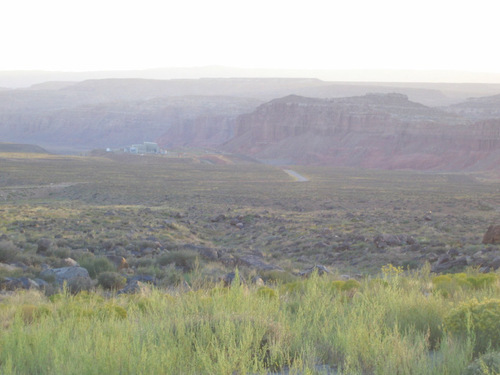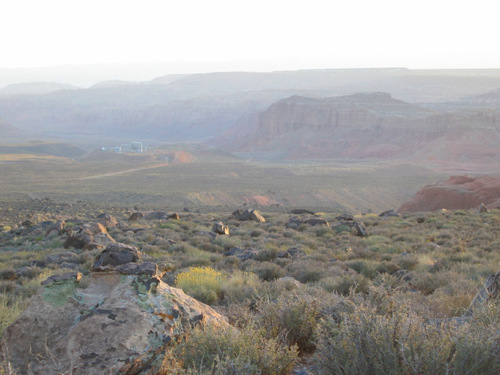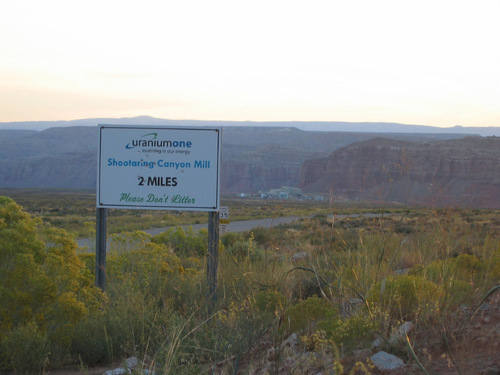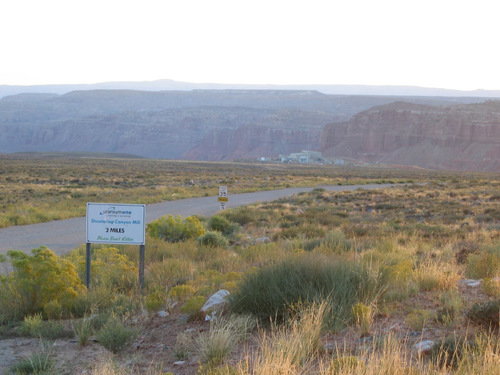This is an archived article that was published on sltrib.com in 2010, and information in the article may be outdated. It is provided only for personal research purposes and may not be reprinted.
Ticaboo • Syd Auster's father flew fighter jets to protect American soil, including this dusty company town off a two-lane road to Lake Powell.
But soon the same mineral-rich landscape that Auster's dad safeguarded decades ago will be largely owned by the country he once guarded against. By year's end, the Russian mining company Atomredmetzoloto (ARMZ) will have a controlling stake in the Canadian company Uranium One.
When that happens, the town itself, the Shootaring Canyon uranium mill a few miles up the highway, more than 10,000 acres of uranium claims in Utah and holdings in South Dakota, Wyoming and Texas — all of it will be in the portfolio of ARMZ's parent company, Rosatom, the Russian nuclear agency, which last month provided fuel for Iran's nuclear power plant.
"That's kind of scary," said Auster, who is sure her father and the people who built the mill and the town for its workers never intended their labors to serve the borderless uranium industry of today. "It's too global when the rest of the world owns our country."
The pending sale is stirring up interest everywhere from Ticaboo's dirt driveways to the shiny corridors of the U.S. Capitol, where four members of Congress last week said the deal might threaten national security and should be stopped.
The controversy can easily be blamed on the globalization of the nuclear industry, a trend that kicked into high gear in 1993 with the Megatons to Megawatts program.
By taking about 440 tons of nuclear material from Soviet warheads — equal to about 16,000 warheads — and transforming it into fuel for U.S. nuclear power plants, the program reduced the likelihood of nuclear proliferation.
Another result was the disintegration of boundaries in the uranium-mining industry, a trend that has picked up in uranium-rich Utah.
For instance, Canada-based Denison Mines not only mines uranium from its southeastern Utah claims. It also operates a uranium-processing mill near Blanding that is the only active plant of its kind in the nation.
Uranium One, meanwhile, snatched up properties once owned by U.S. Energy Corp., of Golden, Colo., such as the mill, reserves and the town.
Sarah Fields, director of the Moab-based group Uranium Watch, called the situation "rather bizarre," because uranium mining in the Four Corners area was born in the last century to supply weapons for World War II and later the Cold War.
"It's an odd, odd situation," she said.
Jeff Parsons, an attorney for a watchdog group called Western Mining Action Project, has been considering what the trend means in Wyoming. There, the ownership change would affect several Uranium One assets, including a proposed mill and three mines.
Parsons notes that the foreign companies with claims to U.S. minerals pay no royalties under the 1872 Mining Act.
"Everywhere else in the world they would have to pay a royalty or a tax for the minerals." he said. "We're literally giving it away to these foreign countries."
Parsons said he is not sure if his group will weigh in on the regulatory review of the ownership control that is now being done by the U.S. Nuclear Regulatory Commission. That assessment, which is open for public comment until Oct. 20, looks only at whether the controlling owners have the technical know-how and the financial wherewithal to operate the Wyoming facilities.
Meanwhile, the Utah Division of Radiation Control is doing a similar review. The division has oversight authority for the Shootaring Canyon Mill even though it has been shut down for all but the first four months of its 28 years.
"This change in control does not impact the operations," said John Hultquist, who is responsible for the state's regulatory review and notes that the Russian connection is not part of the state's evaluation. "For us, I don't think it's going to be a big deal."
Uranium One shareholders voted on Aug. 31 to allow ARMZ to more than double its stake in the company. Rob Buchanan, investor relations manager for the Canadian company, indicated that nothing is expected to change in Utah because of the deal.
"I can tell you that we don't have plans to develop any of our assets in Utah for the foreseeable future," he said in an e-mail, "and we don't expect this to change after our transaction with ARMZ closes."
He also noted, "In general, Uranium One's U.S. production will be for the purpose of providing additional domestic supply to U.S. customers."
Former U.S. Sen. Jake Garn, of Utah, a Cold War-era military pilot, said he is not troubled by this new ownership and generally favors breaking down "artificial barriers" that prevent good business and political relationships.
"To me," he said, "the issue with uranium is 'Do we have the ability to verify, and do we have control over where it goes?' … Verification is everything."
But four members of Congress are not so sanguine about the deal.
They wrote a letter last week urging U.S. Treasury Secretary Timothy Geithner to block it. Not only would the Russian-controlled company own 20 percent of U.S. uranium capacity, but it would also support a Russian energy industry that is fraught with corruption and already supplying nuclear-technology support to autocratic regimes in Iran and Myanmar, the lawmakers said.
"We believe the takeover of essential U.S. nuclear resources by a government-owned Russian agency, as would occur under the proposed transaction, would not advance the national security and interests of the United States," said the Tuesday letter sent by U.S. Rep. Howard P. "Buck" McKeon, of California, and three other House Republicans. "We urge the [Treasury Department's Committee on Foreign Investment] to recommend the President block this transaction."
Back in Ticaboo, residents have had mixed reactions to the news that there might be a new owner in town soon.
Jim Bell, who retired to his little piece of paradise here 12 years ago, hasn't been troubled by the rumors he has heard about a sale. He's more concerned about the high rates Uranium One charges — about three or four times the rates Wasatch Front users pay.
"It would be nice," he said, "to get somebody in here to improve the place."
Around the corner, Ticaboo newcomer Layne Atchley shared Bell's sentiments.
"I've got nothing against Russians more than anybody else as long as there are some controls on what they do with the uranium, since it can be used to kill and all," said the former Montanan, sitting outside the trailer he has lived in for about a year.
The water pressure is terrible. The electricity costs too much. But, settled in as he and his family are, it would be difficult to move at this point. Town leaders are working to make things right — they might even apply for a grant to bring some solar energy into town, he said.
"That's all we need," he said, "somebody who cares about the people who are here already."
Borderless nuclear assets
A pending purchase of a controlling interest in a Canadian company means nuclear-related and other properties in Utah and other parts of the U.S. will be in the portfolio of the Russian nuclear agency. The Utah assets include 10,000 acres of uranium claims, a shuttered uranium mill and the town of Ticaboo.













